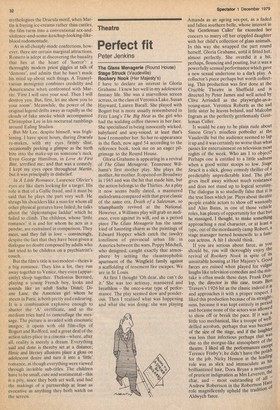Theatre
Perfect fit
Peter Jenkins
The Glass Menagerie (Round House) Stage Struck (Vaudeville) Rookery Nook (Her Majesty's) I have to declare an interest in Gloria Grahame, I knew her well in my adolescent fantasy life. She was a marvellous screen actress, in the class of Veronica Lake, Susan Hayward, Lauren Baeall. She played with Bogart but is more usually remembered in Fritz Lang's The Big Heat as the girl who had the scalding coffee thrown in her face. She specialised in being innocently wicked, babyfaced and sexy-voiced, at least that's how I remember her. So her re-appearance in the flesh, now aged 54 according to the reference book, took me on an eager pilgrimage to the Round House.
Gloria Grahame is appearing in a revival of The Glass Menagerie, Tennessee Williams's first mother play. She plays the mother, his mother. It opened on Broadway in 1945 and was the hit that made him, but the action belongs to the Thirties. As a play it now seems badly dated, a mannered melodrama compared with that great classic of the same era, Death of a Salesman, so triumphantly revived at the National. However, a Williams play will grab an audience, even against its will, and as a period piece The Glass Menagerie has the same kind of haunting charm as the paintings of Edward Hopper which catch the tawdry loneliness of provincial urban life in America between the wars. Poppy Mitchell, who designed, caught exactly that atmosphere by setting the claustrophobic apartment of the Wingfield family against a scaffolding of tenement fire escapes. We are in St Louis.
At first I thought 'Oh dear, she can't do it.' She was too actressy, mannered and breathless — the once-a-star type of performance. The play seemed slow and ponderous. Then I realised what was happening and what she was doing; she was playing Amanda as an ageing sex-pot, as a faded and fallen southern belle, whose interest in 'the Gentleman Caller' far exceeded her concern to marry off her crippled daughter with her child's collection of glass animals. In this way she wrapped the part round herself, Gloria Grahame, until it fitted her, almost perfectly. She overdid it a bit, perhaps, flouncing and pouting, but it was a powerfully sensual performance which gave a new sexual undertone to a dark play. A collector's piece perhaps but worth collecting. This production was first done at the Crucible Theatre in Sheffield and is directed by Peter James and well acted by Clive Arrindell as the playwright-as-ayoung-man, Veronica Roberts as the sad little sister he leaves behind, and Malcolm Ingram as the perfectly gentlemanly Gentleman Caller.
It would be easy to be plain rude about Simon Gray's mindless potboiler at the Vaudeville but the audience seemed to lap it up and it was certainly no worse than what passes for entertainment on television most nights of the week. Who am I to object? Perhaps one is entitled to a little sadness when a good writer stoops so low. Stage Struck is a slick, glossy comedy thriller of a predictably unpredictable kind. The plot gives itself away without much resistance and does not stand up to logical scrutiny. The dialogue is so studiedly false that it is the true lines which jar. Plays about theatre people enable actors to show off wantonly and Alan Bates, in one of those vehicle roles, has plenty of opportunity for that but he managed, I thought, to make something approaching a real character, or at least a type, out of the mordauntly camp Robert, a stage manager turned housewife to a famous actress. A hit I should think.
If you are serious about farce, as You should be, you will thoroughly enjoy the revival of Rookery Nook in spite of its unsuitable housing at Her Majesty's. Good farces are ruined when played for vulgar laughs like television comedies and the mistake is often made these days. Frank Dunlop, the director in this case, treats BO Travers's 1926 hit as the classic indeed it IS and approaches it with a proper respect. I liked this production because of its straight'. ness, because it was kept entirely in period and because none of the actors was allowed to show off or break the pace. If it was a little too mechanical, like a troupe of Well drilled acrobats, perhaps that was because of the size of the stage, and if the laughter was less than infectious perhaps that Was due to the morgue-like atmosphere theatre. I liked all the performances excel: Terence Frisby's; he didn't have the polls for the job, Nicky Henson in the leadirl,g role was as slick and immaculate as hIs brilliantined hair, Dora Bryan a mountalne of prurient indignation as Mrs Leverett, th char, and — most outstanding of all Andrew Robertson in the Robertson Hal.' role magnificently upheld the tradition 0 Aldwych farce.











































 Previous page
Previous page